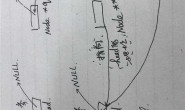|
Problem A |
|
| 10分 |
奔跑吧,参考:
#include <math.h>
#include <stdio.h>
int sum_factor(int n)
{
int i, sum;
sum = 1;
for (i = 2; i <= n / 2; i++)
{
if (0 == n % i) sum += i;
}
return sum;
}
int count(int start, int end, int badness)
{
int i, gap, sumf, res;
sumf = res = 0;
for (i = start; i <= end; i++)
{
sumf = sum_factor(i);
if (sumf >= i) gap = sumf - i;
else gap = i - sumf;
if (-badness <= gap && gap <= badness) res++;
}
return res;
}
int main()
{
int i = 1;
int start, end, badness;
while (scanf("%d%d%d", &start, &end, &badness))
{
getchar();
if (0 == start && 0 == end && 0 == badness) break;
printf("Test %d: %d\n", i, count(start, end, badness));
i++;
}
return 0;
}
|
| 10分 |
应该注意到 Divisor Function(1到n中所有能整除n的整数之和)为积性函数,即对于两互质的整数p,q有f(pq) = f(p) f(q),应尽可能利用这一点,缓存f(n)的值以备将来计算f(kn)使用
代码仅供参考: #include <stdio.h>
#include <stdlib.h>
#define MAX_N 1000000
typedef long long LL;
LL table[MAX_N] = {0, 1};
LL sod(int n)
{
if (table[n] != 0) return table[n];
int p, q, c;
for (p = 2; p < n / 2; p++)
{
if ( n % p == 0 ) break;
}
if (n % p != 0)
{
table[n] = 1 + n;
return table[n];
}
else
{
int pn = p;
LL sum = 1 + p;
while ((q = n / pn) % p == 0)
{
pn *= p;
sum += pn;
}
table[pn] = sum;
table[n] = table[pn] * sod(q);
return table[n];
}
}
LL badness_of(int n)
{
LL ret = sod(n) - 2 * n;
if (ret < 0) ret = -ret;
return ret;
}
int main(void)
{
int start, end, badness, n = 1;
while(scanf("%d%d%d", &start, &end, &badness) == 3)
{
if ((start == 0) && (end == 0) && (badness == 0))
{
break;
}
int count = 0, i;
for (i = start; i <= end; i++)
{
count += badness_of(i) <= badness;
}
printf("Test %d: %d\n", n++, count);
}
return 0;
}
|
| 10分 |
#include<stdio.h>
#include<time.h>
unsigned int getbadness(unsigned int n)
{
unsigned int prime_divisors[7][2]={0}; // 保存质因数及其个数,prime_divisors[i][0]为质因数,prime_divisors[i][1]为其个数
unsigned int prime_divisors_length=0; // ps的有效长度
unsigned int i;
unsigned int divisors_num=1; // 用于计算因数个数(包括n自身)
unsigned int sum=0; // 用于计算因数的和
unsigned int n_bak=n;
// 以下为试除法求n的质因数分解
// 试除 2
if(!(n&1))
{
prime_divisors[prime_divisors_length][0]=2;
while(!(n&1))
{
++prime_divisors[prime_divisors_length][1];
n>>=1;
}
divisors_num*=prime_divisors[prime_divisors_length][1]+1;
++prime_divisors_length;
}
// 试除 3
if(!(n%3))
{
prime_divisors[prime_divisors_length][0]=3;
while(!(n%3))
{
++prime_divisors[prime_divisors_length][1];
n/=3;
}
divisors_num*=prime_divisors[prime_divisors_length][1]+1;
++prime_divisors_length;
}
for(i=1;n>1;++i)
{
if((6*i-1)*(6*i-1)>n)
{
prime_divisors[prime_divisors_length][0]=n;
prime_divisors[prime_divisors_length++][1]=1;
divisors_num<<=1;
break;
}
// 试除 6i-1
if(!(n%(6*i-1)))
{
prime_divisors[prime_divisors_length][0]=6*i-1;
while(!(n%prime_divisors[prime_divisors_length][0]))
{
++prime_divisors[prime_divisors_length][1];
n/=prime_divisors[prime_divisors_length][0];
}
divisors_num*=prime_divisors[prime_divisors_length][1]+1;
++prime_divisors_length;
}
// 试除 6i+1
if(!(n%(6*i+1)))
{
prime_divisors[prime_divisors_length][0]=6*i+1;
while(!(n%prime_divisors[prime_divisors_length][0]))
{
++prime_divisors[prime_divisors_length][1];
n/=prime_divisors[prime_divisors_length][0];
}
divisors_num*=prime_divisors[prime_divisors_length][1]+1;
++prime_divisors_length;
}
}
// 以下为求除n自身以外的因数的和
for(i=0;i<divisors_num-1;++i)
{
unsigned int divisor=1,j,ii=i,k;
for(j=0;ii;ii/=prime_divisors[j++][1]+1)
{
k=ii%(prime_divisors[j][1]+1);
while(k--)divisor*=prime_divisors[j][0];
}
sum+=divisor;
}
// 返回因数和与n的差的绝对值
if(sum>n_bak)return sum-n_bak;
else return n_bak-sum;
}
int main()
{
unsigned int i;
clock_t c=clock();
for(i=2;i<1000000;++i)
getbadness(i);
printf("time:%lfs\n",(double)(clock()-c)/CLOCKS_PER_SEC);
return 0;
}
时间 1.086763s 可以吗 |
|
我用最原始的方法做是超时的
|
|
| 10分 |
查表法
|




